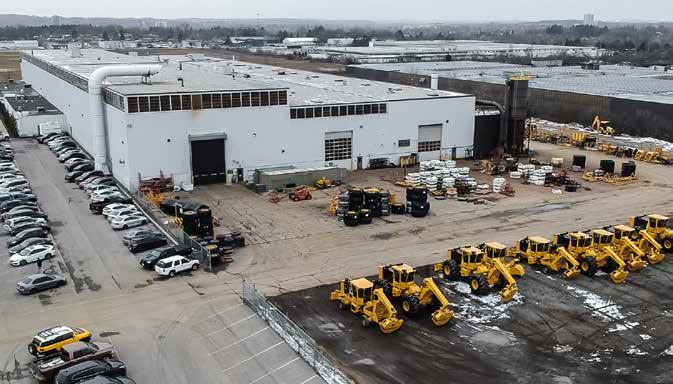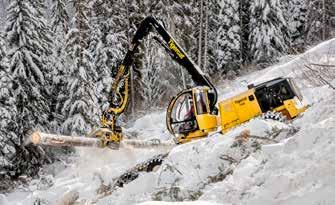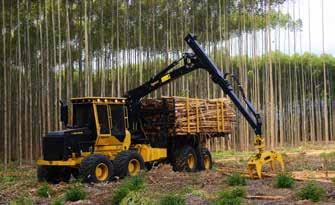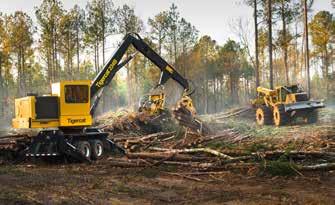
6 minute read
RENISHAW
Tigercat set itself the task of increasing production efficiency and throughput through greater use of automation. A wide-ranging review of existing production processes identified workpiece set-up as a particular area for improvement.
Plant-wide standardisation on a new automated workpiece probing solution would need to accommodate the very large scale and diversity of Tigercat’s thick gauge steel high-tolerance parts, as well as the range of different production line operations.
Advertisement
Probes would need to be capable of accurately inspecting critical, hard-to-reach features and be robust enough to operate in close proximity to new automated welding cells.
At the same time, the company also wanted to utilise the MazaCheck health check diagnostic capabilities of its Mazak Versatech V100N, a production-critical 5-axis double-column machining centre for very large parts.
Solution
A review of a wide range of machine tool probe technologies led to the selection of Renishaw’s high-accuracy touch probes with radio transmission and, PC-based probing software.
David Hodder, Machine Shop Supervisor, Tigercat said, “We were actually looking at several different companies for the provision of the machine probing systems we needed. We settled with just one company that we felt comfortable
Tigercat® Industries Inc - Cambridge, ON with and that fits perfectly with our engineering culture. That company was Renishaw. They provide good technical support, their on-site technicians are very knowledgeable, and I’d describe their equipment as top-notch.”
Designed to aid workpiece set-up and inspection on multi-tasking machines and machining centres, the flexible RMP60M spindlemounted radio transmission probe was deployed by Tigercat throughout its Cambridge production line. Drawing on Renishaw’s wide range of compatible ceramic stem and ruby ball styli, the company was able to develop automated set-up solutions, customised to meet the specific demands of Tigercat’s many large and varied workpieces.
The RMP60M’s proven kinematic resistive probe mechanism, combined with its unique frequency hopping spread spectrum (FHSS) radio transmission provided Tigercat with a robust solution capable of tolerating any signal interference effects from welding processes and overcoming any line-ofsight challenges.
Operating in the 2.4GHz waveband, the RMP60M machine probe is compliant with radio regulations in all major industrial markets. It offers a variety of activation options, an adjustable trigger force and measurement repeatability of ±1 µm 2σ. Renishaw RMI-Q combined radio transceiver and machine interfaces were employed throughout the plant, converting signals from the RMP spindle probes into voltage-free solid state relay outputs for
Success Story | RENISHAW
724G FELLER BUNCHER - Provided by Tigercat®


1185 HARVESTER - Provided by Tigercat®[
1075 FORWARDER - Provided by Tigercat®


Tigercat® Industries Inc. forestry equipment
the machine controllers.
For Tigercat’s Mazak Versatech V100N 5-axis machine, an RMP600 probe was specified. A compact, high accuracy touch probe equipped with the same FHSS radio communication capability as the RMP60M, it provided Tigercat with all the benefits of automated workpiece set-up along with the ability to measure complex 3D part geometries to unrivalled sub-micron levels.
The probe uses Renishaw’s RENGAGE™ technology (a combination of proven silicon strain gauges and ultra-compact electronics) and delivers high-accuracy measurement even when using long and custom styli – ideal for Tigercat’s applications which often require measurement of features in hard-to-reach locations.
Finally, Renishaw’s simple-to-use Productivity+™, PC-based software was used to seamlessly program and integrate inspection routines within the V100N machining cycles.
Results
The integration of Renishaw’s high-accuracy radio transmission probes into Tigercat’s production processes has seen workpiece set-up times reduce by 75%. Manual set-ups that once took an hour have been replaced by automated set-ups that take 10-15 minutes.
The new machine probing systems log and record every part they touch. If a part cannot be aligned correctly or does not conform to specification, the operator is immediately notified. Data can be collected to track machine and process performance over time.
Since Tigercat partnered with Renishaw on automated machine probing the company has achieved a 40% increase in weekly production figures, and expects further improvements to be made going forward.
There is also now a greater consistency in dayto-day part production and a new-found freedom to be able to move machine operators across machining centres when production demands dictate. The risk of human error has been virtually eradicated and operator safety has been improved by eliminating manual operator interventions.
Over time, Tigercat has evolved its use of probing from basic part set-up (pre-machining) to fully integrated, in-process control and part verification, all before the part leaves the machine bed.
It has led to improvements across the board, in terms of machine cycle times, part quality and operator safety. It is also being used for machine health checks, giving Tigercat even greater confidence that all of its production processes are perfectly up to specification. www.renishaw.com
Industry News | SCHULER
Schuler presses form parts for Volkswagen ID.3
A-pillar and sill of the new electric car are being produced on a hot stamping line at the supplier Snop in Klášterec, Czech Republic
Many parts for Volkswagen’s new electric car ID.3have their origins in Schuler presses. The supplier Snop produces A-pillars and sills on the hot stamping line at its location in Klášterec (Czech Republic) in the south of Zwickau (Germany), where the ID.3 rolls off the line. Outer body parts for the ID.3 are also being produced on Schuler machines – like on a press line which Schuler will install at the Volkswagen site in Zwickau this spring.
The commissioning of the hot stamping line took place in the summer of last year.The 1,200 metric tons press hardening system comes with blank loader, oven to heat the blanks to 930 degrees Celsius, three-axis twin feeders for their rapid transport, and dies to form and cool the parts. As a general contractor, Schuler offers turnkey systems including all necessary components.Schuler's PCH ("Pressure Controlled Hardening") technology enables optimum distribution of contact pressure, resulting in a short cycle time of up to eight seconds and lightweight as well as high-strength components.

The ID.3 is based on the modular electric drive matrix (MEB) developed by Volkswagen. © Volkswagen
Schuler's hot stamping lines with PCH technology produce light yet high-strength components. © Schuler

The ID.3 is based on the modular electric drive matrix (MEB) developed by Volkswagen. The special model ID.3 1STwith a power of 107 kW and a top speed of 160 kilometers per hourhas a range of up to 420 kilometers and will be delivered in summer of 2020. In addition, there will each be a model with 330 and 550 kilometers range.
Schuler offers customer-specific cutting-edge technology in all areas of forming technology – from networked presses to press shop planning. In addition to presses, the product portfolio also includes automation and software solutions, dies, process know-how and service for the entire metalworking industry. Its customers include automobile manufacturers and automotive suppliers, as well as companies from the forging, household appliance and electronics industries. Presses from the Schuler Group mint coins for more than 180 countries. In the 2018 fiscal year, Schuler generated sales of € 1.212 billion. Schuler AG, founded in 1839 at its headquarters in Göppingen (Germany), has approx. 6 000 employees at production sites in Europe, China and America as well as service companies in over 40 countries. The company is majority-owned by the Austrian ANDRITZ Group.










